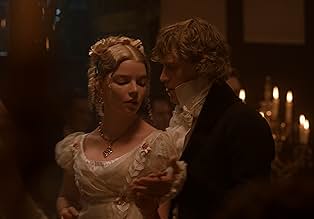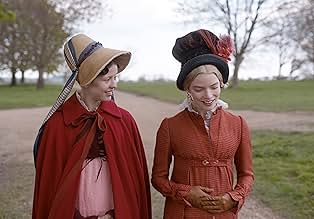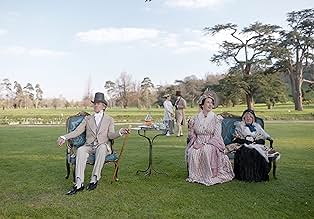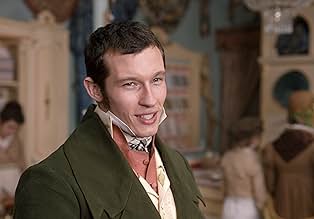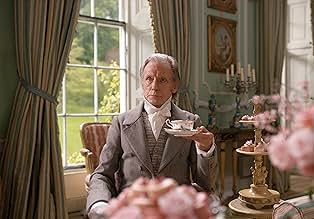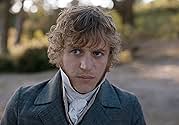Im England des 18. Jahrhunderts mischt sich eine wohlmeinende, aber egoistische junge Frau in das Liebesleben ihrer Freunde ein.Im England des 18. Jahrhunderts mischt sich eine wohlmeinende, aber egoistische junge Frau in das Liebesleben ihrer Freunde ein.Im England des 18. Jahrhunderts mischt sich eine wohlmeinende, aber egoistische junge Frau in das Liebesleben ihrer Freunde ein.
- Für 2 Oscars nominiert
- 11 Gewinne & 61 Nominierungen insgesamt
Handlung
WUSSTEST DU SCHON:
- WissenswertesAll of the music performances in the film are real, played by the actors in character. None is staged.
- PatzerThe Sequence subtitled Winter begins with a carriage drawing up in front of a large tree in full leaf.
- Zitate
Mr. Elton: Dearly beloved friends, we gather here, in the sight of God, to join together this man, and this woman, in holy matrimony, an honorable estate, instituted by God, in this time of man's great in-no-cence...
Mr. Woodhouse: In-no-cence? Innocence, no?
- Crazy CreditsThe film's title has a period at the end, meant to signify the movie as a "period piece" set in the original era.
Ausgewählte Rezension
Autumn de Wilde's Emma, with Anya Taylor-Joy and Johnny Flynn, is not my cup of tea, I'm afraid. My review might be influenced by how much I love Jane Austen's novel and how many times I've watched the 2009 miniseries, but I always give every adaptation a try. And I can't really judge if what I was watching would make sense to an Austen virgin, shall we say, so what seemed disjointed and rushed to me might work perfectly for others.
I'll start with the good: I loved the costumes and the interiors, which were sumptuously beautiful. The wood-shaving ringlets on the women and the high collars on the men were distracting, though. And of course Anya Taylor-Joy made for a quirky and regal Emma (Austenites will be pleased to note that she has perfect posture.) I also loved how Anya Taylor-Joy and Amber Anderson as Jane actually played the pianoforte during the Coles' party (but could have done without Mr Knightley's contribution, when Frank Churchill is supposed to be singing with Jane). BUT. The music was horrendously jarring, alternating between Hanna Barbera cartoon incidentals and freakish folk music. The supporting characters suffered once again - I couldn't honestly tell the difference between Mrs Weston, Mrs Knightley and Mrs Elton, except that Isabella was for some reason a complete cow in this version, and Mr Elton and Frank Churchill were also interchangeable (perhaps that's why Elton never seemed to be without his dog collar, to help tell them apart). Bill Nighy's Mr Woodhouse was a weird combination of fusspot and Edwardian fop, and Johnny Flynn's Mr Knightley strayed way off character by stripping off in his first scene and never really recovered for me. (Apparently, that was a way of 'humanising' the character because he is always 'mansplaining' - very woke.) Anya wasn't kidding when she talked about the focus being on 'bodily functions', by the way - not only are we 'treated' to Knightley's backside, but Emma hitches up her skirts to warm her bare arse by the fire, and the 'cannot make speeches' proposal scene is a bloody mess. Literally. The script leans so heavily on lines from the novel that I think Eleanor Catton thought she was writing an essay for an English Lit exam - Austenites will be happy, but there was no feeling behind any of the grand words. When Emma and Mr Knightley argue, they constantly shout over each other, for instance, instead of the usual playful back and forth.
The whole film felt like a weird mashup between a stage musical and a Victorian farce, with choreographed servants and slapstick humour. There was also a lot of 1996 Emma in there, taking pastel and pastoral scenery from the film and Andrew Davies' wearisome obsession with wealth from the television two-parter. Not on a sliding scale of Emma and Miss Bates, but in how Mr Knightley's strawberry picking party turns into a National Trust promotional video for Wilton House, Salisbury. There's also a lot of emphasis on servants dressing their masters and mistresses, presumably to fit in more scenes of 'natural nudity'.
I went, I watched, I did my duty to Emma. But I think I'll stick with the 2009 miniseries.
I'll start with the good: I loved the costumes and the interiors, which were sumptuously beautiful. The wood-shaving ringlets on the women and the high collars on the men were distracting, though. And of course Anya Taylor-Joy made for a quirky and regal Emma (Austenites will be pleased to note that she has perfect posture.) I also loved how Anya Taylor-Joy and Amber Anderson as Jane actually played the pianoforte during the Coles' party (but could have done without Mr Knightley's contribution, when Frank Churchill is supposed to be singing with Jane). BUT. The music was horrendously jarring, alternating between Hanna Barbera cartoon incidentals and freakish folk music. The supporting characters suffered once again - I couldn't honestly tell the difference between Mrs Weston, Mrs Knightley and Mrs Elton, except that Isabella was for some reason a complete cow in this version, and Mr Elton and Frank Churchill were also interchangeable (perhaps that's why Elton never seemed to be without his dog collar, to help tell them apart). Bill Nighy's Mr Woodhouse was a weird combination of fusspot and Edwardian fop, and Johnny Flynn's Mr Knightley strayed way off character by stripping off in his first scene and never really recovered for me. (Apparently, that was a way of 'humanising' the character because he is always 'mansplaining' - very woke.) Anya wasn't kidding when she talked about the focus being on 'bodily functions', by the way - not only are we 'treated' to Knightley's backside, but Emma hitches up her skirts to warm her bare arse by the fire, and the 'cannot make speeches' proposal scene is a bloody mess. Literally. The script leans so heavily on lines from the novel that I think Eleanor Catton thought she was writing an essay for an English Lit exam - Austenites will be happy, but there was no feeling behind any of the grand words. When Emma and Mr Knightley argue, they constantly shout over each other, for instance, instead of the usual playful back and forth.
The whole film felt like a weird mashup between a stage musical and a Victorian farce, with choreographed servants and slapstick humour. There was also a lot of 1996 Emma in there, taking pastel and pastoral scenery from the film and Andrew Davies' wearisome obsession with wealth from the television two-parter. Not on a sliding scale of Emma and Miss Bates, but in how Mr Knightley's strawberry picking party turns into a National Trust promotional video for Wilton House, Salisbury. There's also a lot of emphasis on servants dressing their masters and mistresses, presumably to fit in more scenes of 'natural nudity'.
I went, I watched, I did my duty to Emma. But I think I'll stick with the 2009 miniseries.
- Flippitygibbit
- 14. Feb. 2020
- Permalink
Top-Auswahl
Melde dich zum Bewerten an und greife auf die Watchlist für personalisierte Empfehlungen zu.
- How long is Emma.?Powered by Alexa
Details
- Erscheinungsdatum
- Herkunftsländer
- Offizielle Standorte
- Sprache
- Auch bekannt als
- Emma
- Drehorte
- Lower Slaughter, Cheltenham, England, Vereinigtes Königreich(Hartfield village)
- Produktionsfirmen
- Weitere beteiligte Unternehmen bei IMDbPro anzeigen
Box Office
- Budget
- 10.000.000 $ (geschätzt)
- Bruttoertrag in den USA und Kanada
- 10.055.355 $
- Eröffnungswochenende in den USA und in Kanada
- 234.482 $
- 23. Feb. 2020
- Weltweiter Bruttoertrag
- 25.932.444 $
- Laufzeit2 Stunden 4 Minuten
- Farbe
- Sound-Mix
- Seitenverhältnis
- 1.85 : 1
Zu dieser Seite beitragen
Bearbeitung vorschlagen oder fehlenden Inhalt hinzufügen








